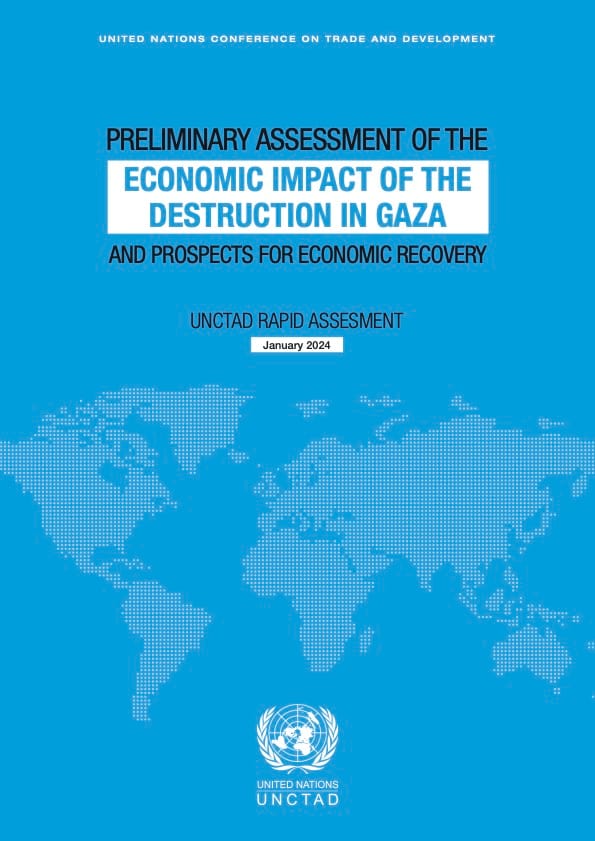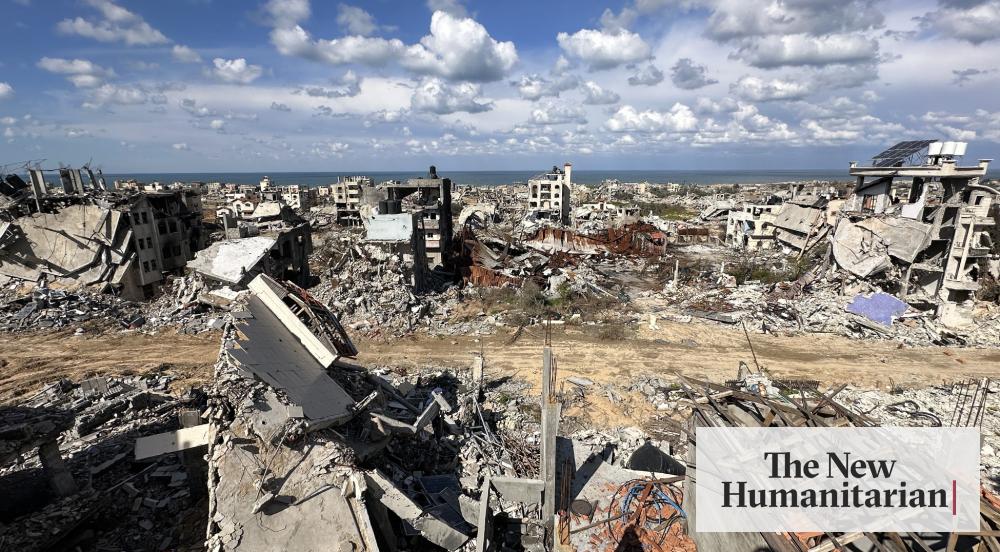#167 THE G|O BRIEFING, FEBRUARY 1, 2024
Antonio Guterres Warns UN Could "Default on its Financial Obligations" | UN: Rebuilding Gaza's Economy Could Cost Billions and Take Decades
Today in The Geneva Observer:
Exclusive: “Without Aggressive Cash Conservation Measures,” UN Could “Default on Its Legal Obligations,” Warns Antonio Guterres
The severity of the liquidity crisis of the UN, first revealed by The Geneva Observer and outlined in a December 28, 2023, interoffice memorandum by the organization’s controller, has now been confirmed by a subsequent letter from the UN Secretary-General himself, dated January 25, 2024. Antonio Guterres’ note, obtained by The G|O and previously undisclosed, leaves no doubt about the financial woes of the organization: “We are now forced to implement aggressive cash conservation measures to avert a default in meeting the legal obligations of the Organization,” Antonio Guterres writes in his internal letter to all UN Global Secretariat personnel, telling them that he has “written to Member States to inform them of the situation.”
In explaining the continued deterioration of the organization’s finances, the UN Secretary-General lays the blame squarely on the Member States that haven’t paid their dues. In his three-page letter, Guterres writes:
“The main cause of the liquidity crisis is this: not all Member States pay their assessments in full. In 2023, we collected 82.3 per cent of the year’s assessment, the lowest in the last five years. Only 142 Member States paid their dues in full—again, the lowest in the last five years. As a result, year-end arrears climbed to $859 million, up from $330 million in 2022.
A secondary cause of the liquidity crisis relates to a shift in the payment patterns of Member States, including the unpredictability of both the timing and the amounts of anticipated collections. In 2023, collections trailed estimates throughout most of the year. We ended the year $529 million short of anticipated collections.”
Guterres’ note “confirms that what has always somehow been presented as a temporary emergency is actually a semi-permanent crisis,” a UN insider familiar with the situation told The G|O. The letter clearly supports that interpretation, warning of further difficult days ahead. If, over the last few years, Member States have come to the financial support of the organization and helped to alleviate the liquidity problems of the regular budget and peacekeeping operations, “we expect the regular budget liquidity situation to be far more challenging in 2024, as we are starting with very little cash. In order to avoid a payment default, […] our initial estimates are that we will need to conserve around $350 million in cash,” cautions Guterres.

Among the new remedial measures to be implemented immediately—which will supplement cost saving measures already deployed, such as energy-saving measures and a reduction in utility bills—official travel will now be limited, purchases of goods and services postponed, and the hiring of consultants and experts minimized.
But the measure with the potential to have the most drastic effect on the organization’s performance—and morale—is the continuation of a hiring freeze that many here had hoped would only be temporary. “Protecting staff from the liquidity crisis to the maximum extent is a priority for me […] I will not relent in doing everything possible to mitigate any pressure on you,” writes Antonio Guterres.
For many here, however, the reassurances of the Secretary-General are not entirely convincing. “This is not a liquidity crisis, this is a budget crisis, and it should be recognized as such; it’s not simply about managing the cash-flow,” a UN source familiar with the situation told The G|O. “It has gotten worse and worse over the years, and always with the same consequence: the workload of the staff keeps increasing. Ultimately, the fear is that by continuing to do more with less, we are telling the Member States that the UN can continue fulfilling its mandate without being properly funded.”
Another concern expressed here by the UN staff is the lack of transparency in the way exceptions to the hiring freeze might be negotiated. As it stands, decisions to grant possible exceptions rest only with the Controller and the Human Resources director in New York. Sources tell us that there are no guidance or criteria to determine how exceptions will be granted to the entities applying. In response to a question by The G|O on how the process was being conducted between Geneva and New York, Alessandra Vellucci, Director of the UN Information Service in Geneva, confirmed that there was no coordination. “They decide and we just apply the decisions,” she told us. Some UN watchers note that in a top-down organization like the UN, unaccustomed to transparency, the management of the crisis may prove challenging.
UN specialized agencies are not directly affected by the financial situation. But OCHA, OHCHR and peacekeeping operations are impacted, and the effects will be felt in the field: “This is particularly worrisome, as the UN is often the only organization present in countries where the most vulnerable populations are in need of help,” a senior European diplomat told The G|O, adding “in the current context, granting visibility and predictability to the UN in managing its finances is not only indispensable, it’s a duty.”
As host country of the UN, Switzerland’s Foreign Ministry told the G|O by email that “it is very concerned about this recurring liquidity crisis. Switzerland regularly calls on other member states to pay their annual contributions. It is important that all states, regardless of the amount of their contribution, settle their accounts as soon as possible, to enable the UN to continue its work. In the event of late payment, we ask all member states to inform the UN in a transparent manner of the date on which the organization can expect to receive payment. This transparency would enable the organization to plan its cash flow accordingly.”
As we previously wrote, the financial crisis, long in the making, is undoubtedly linked to current global geopolitical dynamics. It comes at a moment when the UN is already facing a political crisis, and against the backdrop of a growing debate about the effectiveness of global governance and a push for reform. “We need to ask what this crisis means in terms of the future of these institutions,” one senior diplomatic source told The G|O. Other sources go so far as to say that for some Member States, dragging their financial feet could indeed be politically motivated.
With so many Member States delinquent in their payments, some UN watchers here are now openly staring to wonder if this is deliberate. “Death by cuts? Multilateralism à la carte, where some parts of the system are funded and others not? Is this a way to weaken the UN? I think the question needs to be asked,” a seasoned expert and defender of the multilateral system told The G|O.
-PHM
From Geneva, Another Piece of Evidence to Document Gaza’s Hellish Reality—and Future

“The first casualty of war is always truth,” the adage goes. But truth always comes out eventually. Slowly but very surely, from extraordinarily brave reporting from Palestinian journalists on the ground, to social media, drone footage, satellite data and even tightly controlled images from the Israeli military, the full extent of the devastation of the Gaza Strip is, one hundred days on, becoming apparent in all its tragic magnitude. To all this, a report released yesterday evening (January 31) in Geneva by UNCTAD, the UN Conference on Trade and Development, adds a significant additional amount of evidence, which allows one to not only grasp Gaza’s hellish current reality but also its bleak future.
UNCTAD is not a humanitarian agency. The organization deals with trade and development; it produces economic models and figures. On the economic prospects of Gaza, the latest estimates are nothing but horrifying, the report’s main conclusion encapsulated in a single paragraph:
“If the current military operation were to end immediately with reconstruction starting right away and the 2007-2022 growth trend persists with an average growth rate of 0.4 per cent, it would take Gaza until 2092 just to restore the GDP levels of 2022 with GDP per capita and socioeconomic conditions continuously declining. […] Even with the most optimistic scenario that GDP could grow at 10% annually it would still take Gaza’s GDP per capita until 2035 to [reach the] pre-blockade level of 2006.”
In various forms, Israel’s occupation of Gaza started 46 years ago, in 1967. Now, UNCTAD tells us that as result of Israel’s response to the Hamas attack of October 7, it might take 70 years for Gaza’s economy to recover. Its report, UNCTAD says, “paints a daunting picture of the development challenges ahead.” Its authors estimate that the economy of the coastal enclave had already contracted by 4.5% in the first three-quarters of 2023, in the months preceding the war.
The military operation has, to no surprise, the organization’s economists say, greatly accelerated the decline, precipitating a 24% GDP contraction and a 26.1% drop in GDP per capita for the entire year. “I think the main takeaway from the report is that the level of destruction that we're witnessing in Gaza is unprecedented. It’s going to take a lot of efforts from the international community for the rebuilding and recovery in Gaza,” commented Rami Alazzeh, an UNCTAD expert on the economy of the Occupied Palestinian Territories.
As a direct consequence of years of Israeli blockade, Gaza’s economy was already in a terrible state even before the war. In one of its previous reports, UNCTAD had written that “living in Gaza in 2022 meant confinement in one of the most densely populated spaces in the world, without electricity half the time, and without adequate access to clean water or a proper sewage system. It meant a 65% probability of being poor, 41% probability of dropping out of the labor force in despair, and for those looking for work, a 45% probability of being unemployed. […] Women and children are the hardest hit.”
UNCTAD’s latest report was compiled “using innovative satellite imagery and official data.” According to the United Nations Satellite Centre (UNOSAT), from 7 October to 26 November, the Israeli bombardment damaged 37,379 buildings, or 18 per cent of the total structures in Gaza. In the military campaign of 2014, 51 days of bombardment damaged 22,737 structures. It reveals that “the number of children reportedly killed in a little over the first three weeks of bombing in Gaza has exceeded the combined total number of children killed in armed conflicts in more than 22 countries since 2019.” [Here UNCTAD relies on data from Save the Children.]

Using forensic analysis of satellite pictures and videos from the Strip, the BBC estimates that at least “half of Gaza’s buildings” have been “damaged or destroyed.” The New York Times, which talks about a “war the world can’t see,” reports today (February 1) that Israel's Controlled Demolitions Are Razing Neighborhoods in Gaza.
These images are now everywhere—except, maybe, on Israeli television. In The Price of Netanyahu’s Ambitions, a must-read, in-depth New Yorker report from Israel, David Remnick, the magazine’s Editor in Chief, recently wrote:
“What is not especially visible on Israeli television is the unrelenting horror of Palestinian suffering in Gaza, where more than twenty-three thousand people have been killed in three months, and an estimated 1.9 million have been displaced. Only rarely do Israelis see what the rest of the world sees: the corpses of Palestinian children wrapped in sheets by a mass grave; widespread hunger and disease; schools and houses, apartment blocks and mosques, reduced to rubble; people fleeing from one place to the next, on foot, on donkey carts, three to a bicycle, all the time knowing that there is no real refuge from mortal danger. Gaza is a presence on Israeli television mainly through the dispatches of reporters embedded with the IDF [Israel Defense Forces]. And they tend to emphasize the experience of Israeli soldiers—their missions, their clashes with Hamas fighters, the search for hostages, the crisp pronouncements of generals and officials helicoptering in from Jerusalem.”
A disregard for the suffering in Gaza is hardly limited to reactionary ministers or far-right commentators. Ben Caspit, the author of a biography critical of Netanyahu, recently posted that he felt no compunction about concentrating on the home front. “Why should we turn our attention [to Gaza]?” he wrote. “They’ve earned that hell fairly, and I don’t have a milligram of empathy.”

-PHM
Related content:


Today's Briefing: Philippe Mottaz - Jamil Chade
Editorial assistance: David Jenny
Edited by: Dan Wheeler
©The Geneva Observer, 2024 - All rights reserved


